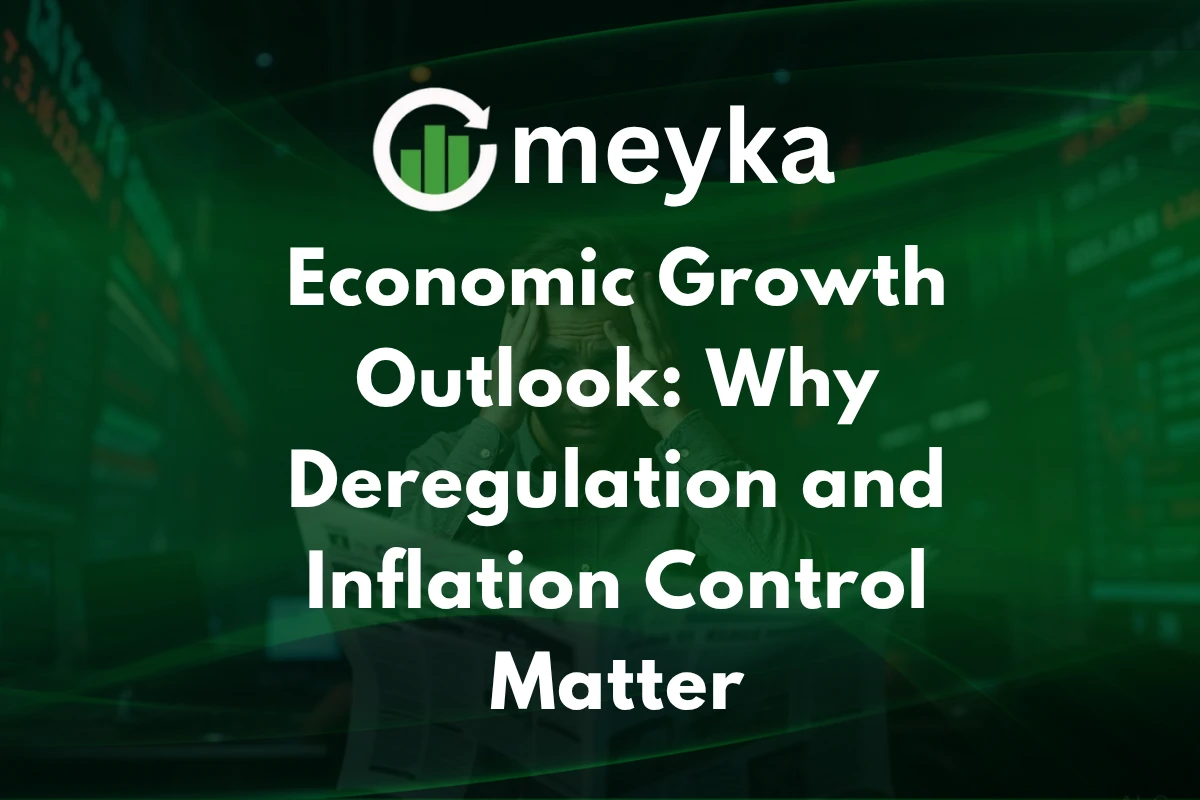Economic Growth Outlook: Why Deregulation and Inflation Control Matter
Economic growth matters to jobs, paychecks, and public services. Right now, policymakers face two big choices, deregulation and inflation control, that shape how fast an economy can expand. This article explains how both tools affect economic growth, why the balance matters, and what central banks and governments should watch next.
Economic Growth: what it means and why it matters
Economic growth refers to a sustained rise in the value of goods and services an economy produces over time. Growth creates jobs, raises incomes, and gives governments tax room for schools and hospitals. When growth slows, unemployment can rise and public budgets tighten. That is why policymakers focus on actions that can boost growth while avoiding big price swings.
Growth supports living standards and long-term prosperity, and weak growth makes it harder for families and businesses to plan.
Economic Growth: How Deregulation Can Help Businesses
Deregulation means removing unnecessary rules that block new firms, slow investment, or raise costs. In principle, smart deregulation can lower business costs, speed up approvals for projects, and encourage entrepreneurship. That can raise investment and productivity, two core drivers of economic growth.
Why does deregulation matter for economic growth?
Because lowering red tape can let companies hire faster, expand production, and adopt new technologies. Better regulation, not no regulation, is the goal: rules that protect consumers and the environment should stay, while obsolete or harmful barriers should be cut.
Economic Growth: the limits and trade-offs of deregulation
Deregulation is not a free lunch. If rules that protect financial stability or the environment are removed too fast, risks rise, and short-term growth can turn into long-term damage. Good reforms pair deregulation with stronger institutions, clear enforcement, and policies that support workers who must reskill.
The role of institutions is central to lasting growth, since strong public institutions help markets function well.
Economic Growth: inflation control and why it matters
Inflation control means keeping price rises predictable and moderate. Low and stable inflation helps businesses plan investments and households plan spending. High or volatile inflation erodes purchasing power and adds uncertainty, which can slow investment and economic growth.
Recent research for European economies finds that inflation volatility and high interest rates used to fight inflation can hurt growth. The study shows that while inflation itself did not always reduce growth in the sample, inflation volatility and aggressive rate hikes were associated with weaker GDP growth.
That points to a delicate trade-off for central banks between taming inflation and avoiding heavy blows to activity.
How does inflation control impact economic growth?
Keeping inflation stable supports long-term investment. But rapid or large interest rate increases to curb inflation can slow growth by raising borrowing costs. Policy must be calibrated and flexible to avoid damaging the recovery.
Economic Growth: the central bank’s role and policy mix
Central banks like the Federal Reserve and the European Central Bank steer inflation with interest rates and guidance. Fiscal policy and structural reforms, including targeted deregulation, complement monetary policy by addressing supply constraints and improving productivity.
Balancing these tools matters: too much tightening can stall growth, too little can let inflation become entrenched. The MDPI analysis warns that aggressive monetary tightening may weigh on growth, so careful policy sequencing is essential.
Economic Growth: global perspective and institutional context
Global institutions such as the IMF and World Bank stress that credible policy frameworks, deeper financial markets, and strong institutions raise resilience and support sustainable growth.
Countries that combine sensible deregulation with stable macro policy tend to attract more investment and grow faster over time. The academic literature also shows that thresholds exist: moderate inflation can be tolerable, but excessive inflation volatility harms output and employment.
I also note a recent post from @IMFNews on X highlighting that monitoring long term inflation expectations is critical for policy credibility, and that stable expectations support growth and investment.
Economic Growth: challenges and risks to watch
Policymakers must watch several risks. Geopolitical shocks, supply chain problems, and a sharp tightening of monetary policy can all slow growth. Structural issues like weak institutions, poor rule of law, or fragmented markets can blunt the gains from deregulation.
Also, when deregulation removes useful protections, financial instability or social costs can follow, which then weigh on growth prospects. The MDPI study underlines that inflation volatility and higher interest rates are significant risks to GDP growth.
Why is balancing these policies hard?
Because deregulation and inflation control work on different time scales. Deregulation may lift investment over the years, while monetary tightening affects demand within months. Policymakers must therefore sequence reforms and communicate clearly to businesses and households.
Economic Growth: lessons from history and policy design
Historical episodes show useful lessons. In some cases, sensible deregulation led to productivity gains and faster growth, especially when paired with investments in skills and infrastructure. But where reforms were rushed or poorly designed, short-term gains faded or reversed.
The research evidence suggests that the institutional framework, courts, property rights, and regulatory capacity matter as much as the reform itself. Good reform blends deregulation, strong institutions, and careful macro policy.
Economic Growth: a practical checklist for policymakers
Policymakers aiming to boost sustainable growth should consider five simple steps: make red tape reviewable and transparent, protect core safety and financial rules, invest in skills and infrastructure, keep inflation expectations anchored through credible central bank actions, and coordinate monetary and fiscal policy to avoid abrupt shocks.
These steps help ensure that deregulation supports long-term productivity, while inflation control preserves purchasing power and investment incentives.
Conclusion: the outlook for economic growth
Economic growth depends on a careful mix of policies. Deregulation can unlock investment and innovation, while inflation control preserves the conditions for stable, predictable growth. The evidence shows trade-offs: inflation volatility and aggressive rate hikes can harm growth, while weak institutions reduce the benefits of deregulation.
The smart path is balanced reform, strong institutions, and prudent macro policy, so growth is both higher and more sustainable. Policymakers who get the balance right can boost jobs, incomes, and resilience for years to come.
FAQ’S
Deregulation can boost economic growth by reducing government barriers and allowing businesses to innovate, invest, and expand more freely. It encourages competition and efficiency in the market.
Controlling inflation keeps prices stable, protects consumer purchasing power, and builds confidence for long-term investments, which are essential for steady economic growth.
The main factors of economic growth are labor, capital, natural resources, and technology. Together, they determine how efficiently an economy produces goods and services.
Deregulation does not always cause inflation, but in some cases, it can lead to short-term price adjustments. However, in the long run, efficient markets tend to stabilize prices and support economic growth.
Economic deregulation is the process of reducing or removing government controls in industries to promote competition, improve efficiency, and increase productivity.
A common effect of deregulation is increased innovation and lower consumer costs. It allows businesses to respond more quickly to market needs, leading to overall economic growth.
Disclaimer
This content is for informational purposes only and is not financial advice. Always conduct your research.






